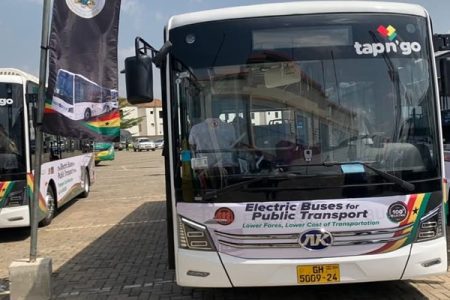Public transport in Ghana has long been a cornerstone of the nation’s mobility, serving as the primary means of travel for millions.
However, persistent challenges such as high operational costs, unreliable services, and environmental concerns have cast a shadow over its effectiveness.
In a bold move to address these issues, Vice-President Dr. Mahamudu Bawumia has unveiled 10 out of the first batch of 100 electric buses (EVs) for Metro Mass Transit Limited (MMT), an initiative set to revamp the company’s operations and redefine public transport in Ghana.
The launch, held in Adentan, Accra, represents a bold step in the Akufo-Addo/Bawumia administration’s agenda to modernize and innovate the country’s transport sector.
These electric buses are expected to significantly cut public transport costs, improve accessibility, and contribute to global efforts to reduce carbon emissions.
The launch is part of the government’s broader vision to integrate green technology into public transportation, promoting sustainability and efficiency.
The pilot phase will operate on routes between Adentan and Accra, and Ashaiman and Accra.
Charging facilities have been installed along these routes to ensure seamless operations.
For decades, operators like Metro Mass Transit Ltd, Aayalolo, and Intercity STC have played a critical role in making transport services accessible and affordable, particularly in remote areas often neglected by private operators.
Charging fares up to 30% lower than market rates, these companies provide an essential lifeline for Ghanaians in underserved communities.
However, the financial burden of high diesel costs, frequent maintenance needs, and revenue leakages has severely hampered their growth.
This economic strain has not only reduced service quality but has also made it difficult to sustain operations, let alone expand.
Recognizing these challenges, the government has embarked on a comprehensive strategy to revitalize the public transport sector.
Central to this plan is the deployment of electric buses, which are poised to deliver significant economic and environmental benefits.
Speaking at the ceremony, Vice-President Bawumia highlighted the economic and environmental impact of the initiative, stating,
“The introduction of these electric buses will lower public transport costs by 40 to 50%, a much-needed economic boost to public transport operators and reduce MMT’s operational and maintenance expenses by 50%.”
He added that this move sets the stage for the transformation of Ghana’s entire public transport sector.
Revolutionizing public transport
Dr. Bawumia expressed pride in overcoming skepticism surrounding the initiative, emphasizing that introducing electric vehicles (EVs) to Ghana’s public transport was both feasible and necessary.
“When I first suggested moving public transport to electric vehicles, many dismissed it as an impossible election promise,” he remarked. “
But if other countries can deploy electric buses for public transportation, why not Ghana?
This is a crucial step for our economy and essential for access to education, jobs, markets, and healthcare.”
He reiterated the government’s commitment to extending the program beyond Metro Mass Transit, with plans to provide credit facilities to members of the Ghana Public Road Transport Union (GPRTU) and other transport associations for acquiring electric buses.
He urged transport operators to join organized unions to benefit from these interventions.
Economic and environmental gains
The economic advantages of the initiative are substantial.
According to MMT Managing Director Albert Adu Boahen, the use of EVs will reduce the company’s fuel costs by 55%, allowing for affordable transport fares and enhanced passenger experiences.
The environmental benefits are equally significant. The adoption of EVs aligns with global efforts to achieve net-zero carbon emissions, making Ghana a regional leader in sustainable transportation.
The government’s Electric Vehicle Policy Framework, launched in 2023, provides a roadmap for the program’s implementation, ensuring its alignment with global best practices.
Building local capacity
To sustain this innovation, the government will collaborate with Technical and Vocational Education and Training (TVET) institutions to train technical staff in EV maintenance and operations.
A new workforce is being prepared to handle the specialized requirements of electric buses, ensuring their long-term sustainability.
Future expansion
Transport Minister Kwaku Ofori Asiama described the current deployment as a pilot phase designed to identify operational challenges before scaling up nationwide.
He reaffirmed the government’s dedication to transforming public transport, saying, “This is just the beginning. We are committed to creating a modern, affordable, and efficient transport system for all Ghanaians.”
As the buses begin operation, optimism is high that they will address long-standing challenges in Ghana’s public transport sector, including high costs and inefficient operations.
“This marks a new era for Metro Mass Transit and Ghana’s public transport as a whole,” said Vice-President Bawumia.
“It is a declaration of our commitment to innovation, sustainability, and the betterment of every Ghanaian’s daily life.”
With this initiative, Ghana takes a significant step toward a sustainable transport future, combining economic efficiency with environmental responsibility.
Unlike their diesel counterparts, electric buses are less expensive to maintain and operate, enabling companies to redirect savings toward fleet renewal and service improvements.
This cost efficiency is expected to lower fares, making transport even more affordable for the average Ghanaian while simultaneously expanding coverage to more remote areas.
The introduction of these buses has created an urgent need for specialized training in electric vehicle maintenance and operation, offering new opportunities for skill development.
The government plans to collaborate with educational institutions to build a skilled workforce, ensuring the smooth operation of the electric fleet
- Friday, April 4, 2025 Newspaper Headlines - 4 April 2025
- Blewett: MTN CEO, a pilot, author, chartered accountant, marathon runner and many more - 3 April 2025
- MTN Ghana launches Y’ello Ladies Network - 3 April 2025

